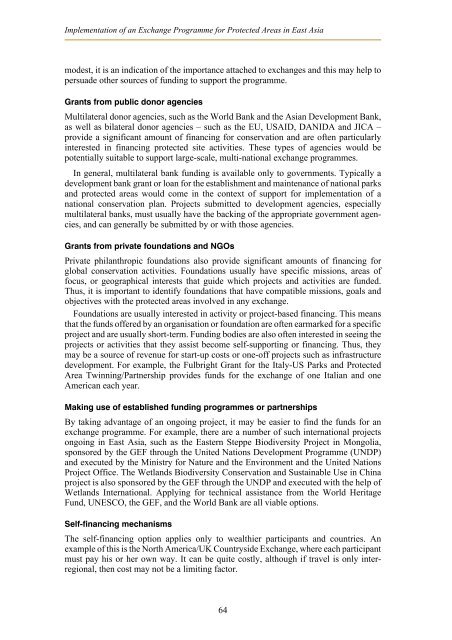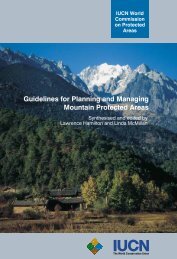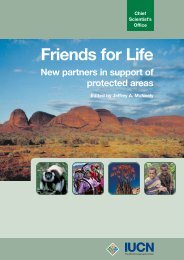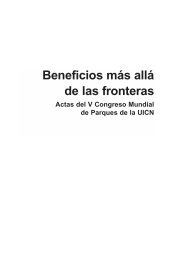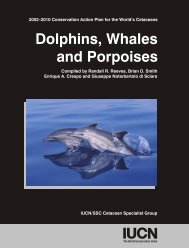Exchange programmes - IUCN
Exchange programmes - IUCN
Exchange programmes - IUCN
You also want an ePaper? Increase the reach of your titles
YUMPU automatically turns print PDFs into web optimized ePapers that Google loves.
Implementation of an <strong>Exchange</strong> Programme for Protected Areas in East Asia<br />
modest, it is an indication of the importance attached to exchanges and this may help to<br />
persuade other sources of funding to support the programme.<br />
Grants from public donor agencies<br />
Multilateral donor agencies, such as the World Bank and the Asian Development Bank,<br />
as well as bilateral donor agencies – such as the EU, USAID, DANIDA and JICA –<br />
provide a significant amount of financing for conservation and are often particularly<br />
interested in financing protected site activities. These types of agencies would be<br />
potentially suitable to support large-scale, multi-national exchange <strong>programmes</strong>.<br />
In general, multilateral bank funding is available only to governments. Typically a<br />
development bank grant or loan for the establishment and maintenance of national parks<br />
and protected areas would come in the context of support for implementation of a<br />
national conservation plan. Projects submitted to development agencies, especially<br />
multilateral banks, must usually have the backing of the appropriate government agencies,<br />
and can generally be submitted by or with those agencies.<br />
Grants from private foundations and NGOs<br />
Private philanthropic foundations also provide significant amounts of financing for<br />
global conservation activities. Foundations usually have specific missions, areas of<br />
focus, or geographical interests that guide which projects and activities are funded.<br />
Thus, it is important to identify foundations that have compatible missions, goals and<br />
objectives with the protected areas involved in any exchange.<br />
Foundations are usually interested in activity or project-based financing. This means<br />
that the funds offered by an organisation or foundation are often earmarked for a specific<br />
project and are usually short-term. Funding bodies are also often interested in seeing the<br />
projects or activities that they assist become self-supporting or financing. Thus, they<br />
may be a source of revenue for start-up costs or one-off projects such as infrastructure<br />
development. For example, the Fulbright Grant for the Italy-US Parks and Protected<br />
Area Twinning/Partnership provides funds for the exchange of one Italian and one<br />
American each year.<br />
Making use of established funding <strong>programmes</strong> or partnerships<br />
By taking advantage of an ongoing project, it may be easier to find the funds for an<br />
exchange programme. For example, there are a number of such international projects<br />
ongoing in East Asia, such as the Eastern Steppe Biodiversity Project in Mongolia,<br />
sponsored by the GEF through the United Nations Development Programme (UNDP)<br />
and executed by the Ministry for Nature and the Environment and the United Nations<br />
Project Office. The Wetlands Biodiversity Conservation and Sustainable Use in China<br />
project is also sponsored by the GEF through the UNDP and executed with the help of<br />
Wetlands International. Applying for technical assistance from the World Heritage<br />
Fund, UNESCO, the GEF, and the World Bank are all viable options.<br />
Self-financing mechanisms<br />
The self-financing option applies only to wealthier participants and countries. An<br />
example of this is the North America/UK Countryside <strong>Exchange</strong>, where each participant<br />
must pay his or her own way. It can be quite costly, although if travel is only interregional,<br />
then cost may not be a limiting factor.<br />
64


